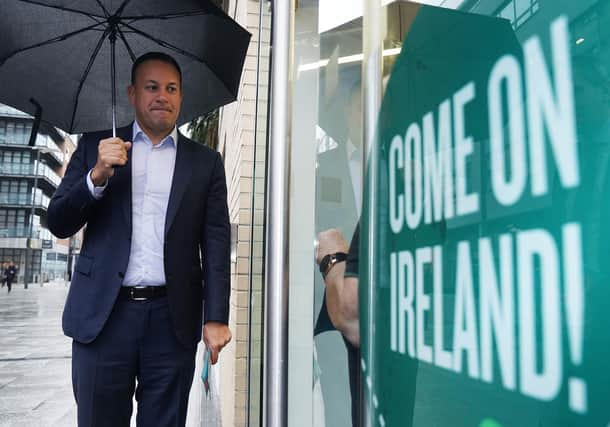Owen Polley: Leo Varadkar does not deserve to have his divisive leadership 'reassessed' by unionists


Many unionists believe that he showed gross insensitivity to their rights and aspirations and he will not change their minds so easily.
Alongside his sidekick Simon Coveney, the Republic’s former foreign minister, Varadkar more than anyone personified Dublin’s anti-British turn in the wake of Brexit. After the EU referendum the then Taoiseach, Enda Kenny, was believed to be preparing for a ‘soft-touch’ land border between this province and the south. In June 2017, though, he was replaced by Varadkar.
Advertisement
Hide AdAdvertisement
Hide AdThe new southern prime minister focussed immediately on demanding ‘special status’ for Northern Ireland that would keep us aligned with the Republic, even if that meant barriers cutting us off from the rest of the United Kingdom.
The former Taoiseach spoke about Sinn Fein and its past with contempt and sarcasm, but he was prepared to use the spectre of republican violence to further his own objectives. In a meeting with EU leaders back in 2018, Varadkar produced an article about the IRA bombing a customs post, to support his view that there could be no added infrastructure, no matter how inconspicuous, at the Irish land frontier.
He later told journalists that the prop was intended to emphasise that the, “possibility of a return to violence (was) very real.” To unionists, it seemed like he was using the notion of renewed attacks as a threat.
In the end, of course, Mr Varadkar got his way, with all the chaos that caused.
Advertisement
Hide AdAdvertisement
Hide AdAfter insisting that ‘no prime minister’ could ever accept such an arrangement, Theresa May signed up to the ‘backstop’. That deal established the principle, which has persisted ever since and now underpins the protocol, that Northern Ireland should be separated from the rest of the UK politically and economically to placate nationalists’ anxieties about a harder border with the Republic.
Varadkar knew very well that this policy was incendiary, but he did not care enough about its destabilising effects on Northern Ireland to cooperate with the UK and seek a less punishing outcome.
Neither was the former Taoiseach’s provocative behaviour confined to Brexit. More than any recent southern leader, he dropped into Northern Ireland without formality and used language that implied his authority extended to this part of the island.
When power-sharing collapsed, due to the Brexit arrangements that he’d helped to bring about, Varadkar claimed that direct rule from Westminster was unacceptable. The Republic, he implied, should enjoy a form of joint authority over Northern Ireland. This interpretation directly contradicted the Belfast Agreement, which in other contexts he said he was trying to protect.
Advertisement
Hide AdAdvertisement
Hide AdIt would be easy to forget, as well, that his government intervened in the British judicial system on behalf of the dissident republican, Tony Taylor. Even the former Alliance leader, David Ford, said that Simon Coveney’s decision to become involved on behalf of a convicted terrorist was ‘unwise’.
More recently, the Republic started a legal case against the UK, in an attempt to stop Britain’s Troubles’ Legacy Act. On that occasion, even Westminster ministers, who are used to turning the other cheek to Dublin’s criticisms, pointed out the Republic’s rank hypocrisy.
The secretary of state, Chris Heaton Harris, said the south should “answer questions regarding its own record on tackling legacy issues in its own jurisdiction.”
Mr Varadkar was often portrayed by his supporters as the archetype of a modern leader and an emblem of the supposedly modern, socially liberal, belatedly diverse Irish state. Yet his legacy is a divided electorate, and the rise of a new form of populism in the Republic, driven by immigration and a sense that ordinary people are ignored in favour of ‘woke’ ideas that they do not share or understand.
Advertisement
Hide AdAdvertisement
Hide AdLikewise, Varadkar, while he did not present himself as a traditional nationalist, presided over an increase in anti-British rhetoric in southern public life and the resurgence of an ‘up the ‘Ra’ culture. The retired RTE journalist, Tommie Gorman, described him recently as the most ‘vocal supporter of a united Ireland’ that Fine Gael ever had as leader.
Presumably, he meant that as a compliment. But it was instructive that, at the same time as he appealed to unionists for a reappraisal of his time in office, Varadkar was expressing continued support for destroying their UK home. In response to a paper by a Dublin think-tank that suggested an all-Ireland state was unaffordable, the outgoing Taoiseach said the constitutional issue should ‘never be about money’.
Mr Varadkar’s successor, Simon Harris, spoke more pragmatically last week about the prospects of a border poll. He said he wanted to see ‘reunification’ but emphasised, “That’s not where my focus and priority are right now and quite frankly, it’s not where I believe our focus and priority should be.”
That’s about as cool a response to the issue as any Taoiseach can realistically afford. At the same time, while few decision makers in the Republic, if they were honest, would say that they actually wanted the difficulties or cost of running Northern Ireland, the idea is deeply ingrained that they are entitled to authority and influence here without responsibility.
Advertisement
Hide AdAdvertisement
Hide AdMr Harris has an opportunity to repair his country’s relationships with the UK and with Ulster unionists. But to do that properly, he will need to interfere less in our internal affairs, stop making populist attacks on Britain and cooperate genuinely with Westminster to lessen the border in the Irish Sea.